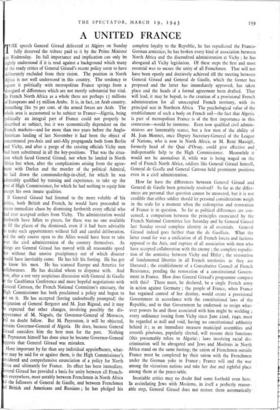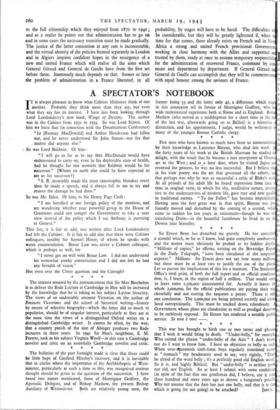A UNITED FRANCE
HE speech General Giraud delivered at Algiers on Sunday fully deserved the tribute paid to it by the Prime Minister on Wednesday. Its full importance and implication can only be rightly understood if it is read against a background which many of the ready critics of General Giraud's recent policy seem to have deliberately excluded from their vision. The position in North Africa is not well understood in this country. The tendency to equate it politically with metropolitan France springs from a disregard of differences which are not merely substantial but vital. hi French North Africa as a whole there are perhaps al millions of Europeans and 15 million Arabs. It is, in fact, an Arab country.
Something like 70 per cent. of the armed forces are Arab. The hole area is accustomed to be subject to France—Algeria, being politically an integral part of France could not properly be described as subject, but it was economically dependent on the tench markets—and for more thin two years before the Anglo- American landing of last November it had been the object of concentrated pro-Axis and anti-Ally propaganda both from Berlin nd Vichy, and after a purge of the existing officials Vichy men had been substituted in all the key-positions. That was the situa- tion which faced General Giraud, not when he landed in North frica but when, after the complications arising from the agree- ent with Darlan and the murder of the political Admiral, e laid down the commandership-in-chief, for which he was dmirably qualified by training and experience, to take up the st of High Commissioner, for which he had nothing to equip him xcept his own innate qualities.
If General Giraud had listened to the more voluble of his rides, both British and French, he would have proceeded to reate immediate chaos by dismissing forthwith every official who d ever accepted orders from Vichy. The administration would orthwith have fallen to pieces, for there was no one available o fill the places of the dismissed, even if it had been advisable o make such appointments without full and careful deliberation, nd the only course open to the Allies would have been to take .er the civil administration of the country themselves. As ngs are General Giraud has moved with all reasonable speed ut without that unwise precipitancy out of which disaster ould have inevitably come. He has felt his footing. He has got know his men. He has scanned Europe and America for ollaborators. He has decided whom to dispense with. And ow, after a not very auspicious discussion with General de Gaulle t the Casablanca Conference and more hopeful negotiations with neral Catroux, the French National Committee's emissary, the igh Commissioner has both proclaimed a policy and begun to ct on it. He has accepted (having undoubtedly prompted) the ignation of General Bergeret and M. Jean Rigaud, and it may e expected that other changes, involving possibly the dis- ppearance of M. Nogues, the Governor-General of Morocco, ill no doubt follow. But M. Peyrouton, it will be objected, mains Governor-General of Algeria. He does, because General iraud considers him the best man for the post. Nothing Peyrouton himself has done since he became Governor-General ggests that General Giraud was mistaken.
More important by far than any individual appointments, what- 'er may be said for or against them, is the High Commissioner's 'nsidered and comprehensive enunciation of a policy for North rica and ultimately for France. Its effect has been immediate. eneral Giraud has provided a basis for unity between all French- n everywhere, most notably between Frenchmen in North Africa d the followers of General de Gaulle, and between Frenchmen d British and Americans and Russians ; he has pledged his complete loyalty to the Republic, he has repudiated the Franco- German armistice; he has broken every kind of association between North Africa and the discredited administration at Vichy ; he has abrogated all Vichy legislation. Of these steps the first and most essential was to secure the unity of all Frenchmen. That will not have been openly and decisively achieved till the meeting between General Giraud and General de Gaulle, which the former has proposed and the latter has immediately approved, has taken place and the heads of a formal agreement been drafted. That will lead, it may be hoped, to the creation of a provisional French administration for all unoccupied French territory, with its principal seat in Northern Africa. The psychological value of the establishment of such a body on French soil—the fact that Algeria is part of metropolitan France is of the first importance in this connexion—would be immense. Even now qualified civil admini- strators are lamentably scarce, but a few men of the ability of M. Jean Monnet, once Deputy Secretary-General of the League of Nations, who is now in North Africa, or M. Rene Massigli, formerly head of the Quai d'Orsay, could give effective and indispensable help to the High Commissioner. Meanwhile it would not be anomalous if, while war is being waged on the soil of French North Africa, soldiers like General Giraud himself, General de Gaulle and General Catroux held prominent positions even in a civil administration.
How far have the differences between General Giraud and General de Gaulle been genuinely resolved? So far as the differ- ences are personal that question cannot be answered, but it is not credible that either soldier should let personal considerations weigh in the scale for a moment when the redemption and restoration of France is in question. So far as political differences are con- cerned, a comparison between the principles enunciated by the French National Committee last Saturday and by General Giraud last Sunday reveal complete identity in all essentials. General Giraud indeed goes farther than the de Gaullists. What the latter stood for was a unification of all French forces and factions opposed to the Axis, and rupture of all association with men who have accepted collaboration with the enemy ; the complete repudia- tion of the armistice between Vichy and Hitler ; the restoration of fundamental liberties in all French territories as they are liberated ; the establishment of a Consultative Council of French Resistance, pending the restoration of a constitutional Govern- ment in France. How does General Giraud's programme compare with this? There must, he declared, be a single French army in action against Germany ; the people of France, when France has regained control of her destiny, would create a provisional Government in accordance with the constitutional laws of the Republic, and to that Government he undertook to resign what- • ever powers he and those associated with him might be wielding ; every ordinance issuing from Vichy since June 22nd, 1940, must be regarded as null and void, having no constitutional adthority behind it ; as an immediate measure municipal assemblies and conseils generaux, popularly elected, will resume their functions (this presumably refers to Algeria) ; laws involving racial dis- crimination will be abrogated and Jews and Moslems in North Africa stand on the same footing; the union of Frenchmen outside France must be completed by their union with the Frenchmen under the German yoke in France ; France will end the war • among the victorious nations and take her due and rightful place among them at the peace-table.
Insatiable critics may no doubt find some foothold even here. In assimilating Jews with Moslems, in itself a perfectly reason- able step, General Giraud does not restore them automatically - . to the full citizenship which they enjoyed from 1870 to 1940 ; and as a realist he points out that administration has to go on and in some cases the necessary transition must be made gradually. The justice of the latter contention at any rate is incontestable, and the virtual identity of the policies framed separately in London and in Algiers inspires confident hopes in the resurgence of a new and united France which will realise all the aims which General Giraud and General de Gaulle have from the first set before them. Immensely much depends on that. Sooner or later the problem of administration in a France liberated, in all probability, by stages will have to be faced. The difficulties %\ be considerable, but they will be greatly lightened if, when t time for that comes, there already exists on French soil in No Africa a strong and united French provisional Governmen working in close harmony with the Allies and supported an trusted by them, ready at once to assume temporary responsibili for the administration of recovered France, commune by co mune and department by department. If General Giraud General de Gaulle can accomplish that they will be commemorat with equal honour among the saviours of France.



























 Previous page
Previous page